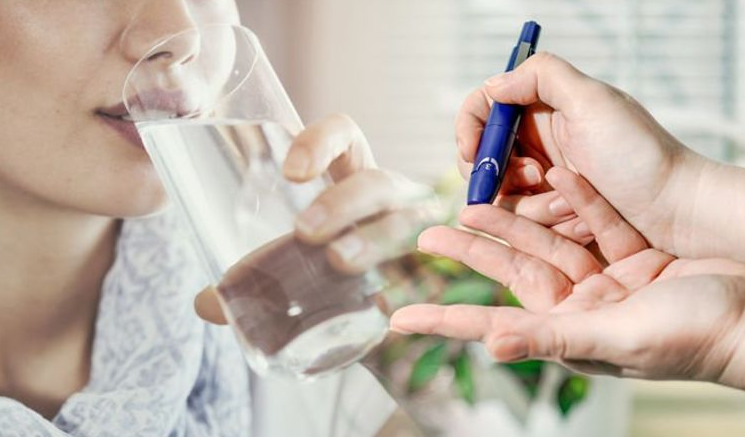The body’s primary fuel source is glucose or sugar. That means that your entire body, including your brain, requires glucose to function correctly. However, while we require glucose for energy, an excess of glucose in the bloodstream can be harmful.
Because water has no carbohydrates or calories, it is the ideal beverage for people with diabetes. Additionally, studies indicate that drinking water may aid in the regulation of blood glucose levels.
Glucose control
When blood glucose levels are up, diabetics’ bodies demand additional hydration. As a result, the kidneys may seek to flush excess sugar via urine.
Water does not boost blood glucose levels, so it is so good for patients with diabetes who have high blood sugar since it allows for more glucose removal from the blood.Diabetes and dehydration
Blood glucose levels that are too high can also raise the risk of dehydration, a problem for persons with diabetes mellitus.
Individuals with diabetes insipidus also have an increased risk of dehydration, unrelated to elevated blood glucose levels.
Diabetes mellitus
When the body attempts to remove excess glucose via urine, drinking water aids in rehydrating the blood. Otherwise, the body will pull water from other sources, such as saliva and tears. If water is scarce, glucose may not be excreted in the urine, resulting in severe dehydration.
Diabetes insipidus
Diabetes inspires is not associated with elevated blood glucose levels but results in excessive pee production. This might leave individuals constantly thirsty and at risk of dehydration. Increased water consumption can help alleviate these symptoms, and your doctor may prescribe you to drink a certain amount of water each day.
How much water should we drink daily?
The European Food Safety Authority recommends that we consume the following amounts of water daily:
- 1.6 liters – around eight 200ml glasses per day for women
- 2 liters – approximately ten 200ml glasses each day for men
These fluid intake values can be met with any liquids; however, water is strongly suggested.
Foods that aid with diabetes management
If you have diabetes, you should monitor your diet carefully. Your diet may have an effect on your blood glucose levels. Experts recommend adhering to the following basic dietary guidelines:
- Include fruits and veggies in your diet
- Include lean meats and protein-rich plants in your diet.
- Reduce your intake of sugar-sweetened beverages and foods.
- Avoid heavily processed foods.
What you drink can have an impact on your blood sugar just as much as what you eat. Numerous beverages include a significant amount of added sugar. Sodas, sports drinks, and a variety of fruit juices are all high in sugar and can induce blood sugar fluctuations. Alcohol also contains a lot of sugar, which can be harmful to your health if you have diabetes.
Diabetes mellitus water
Consuming water is great advice for everybody. The majority of specialists advocate consuming 4–6 cups of water each day for overall health. Water consumption provides a number of advantages, including the following:
- Nutrients and oxygen are transported to your cells via the bloodstream.
- Joint lubrication
- Organs and tissues protection
Maintaining a healthy body temperature
Water is especially critical if you have diabetes. It’s a good beverage for diabetics because it has no sugar. Water consumption might also have a general effect on your blood sugar levels.
When your blood sugar levels rise, your body makes an attempt to eliminate the excess glucose. However, without insulin to lower blood sugar levels, your system will turn the sugar into the urine, which you will eliminate by going to the bathroom. When this occurs, you may get dehydrated as a result of fluid loss. Consuming water replenishes the fluids lost through urinating.
Dehydration can also result in elevated blood sugar levels. When your blood volume decreases due to dehydration, the sugar concentration in your blood increases. By drinking water throughout the day, you can avoid dehydration and improve your ability to manage blood sugar.
Water for the treatment of diabetic insipidus
Diabetes insipidus is a disorder that shares some characteristics with the more prevalent forms of diabetes mellitus. However, in cases of diabetes insipidus, blood glucose levels do not rise too high. Rather than that, your body constantly produces an excessive amount of urine.
If you have diabetes insipidus, you may experience frequent thirst and are more susceptible to dehydration. Your doctor will advise you on how much water to drink. Water will alleviate some of your symptoms and help you avoid the consequences associated with dehydration.
Water helps reduce hyperglycemia (excessive blood sugar).
According to one study, drinking water on a regular basis may help reduce the start of hyperglycemia. Hyperglycemia, which is occasionally referred to as pre-diabetes, happens when your blood sugar level is greater than normal. Hyperglycemia can eventually result in the same types of health concerns as diabetes.
Researchers presented the findings of a nine-year study of 3,615 persons between the ages of 31 and 65 in a 2011 publication. Each individual began the trial with normal blood glucose levels. Over time, 565 study participants developed hyperglycemia. 202 of those with hyperglycemia later developed diabetes.
The researchers discovered that those who acquired hyperglycemia consumed less water than those whose blood sugar levels remained within the usual range. They concluded that persistent dehydration is associated with the development of hyperglycemia. This does not mean that everyone who does not drink enough water will get pre-diabetes, but it does indicate the critical nature of water consumption for overall health.
Consult your doctor if you have any queries about the amount of water you should drink to manage your diabetes.

